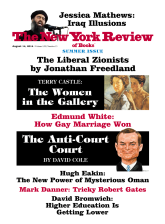In response to:
Partial Disclosure from the July 10, 2014 issue
To the Editors:
In my New York Times review of Glenn Greenwald’s No Place to Hide: Edward Snowden, the NSA, and the US Surveillance State, I wrote:
The Snowden leaks were important—a legitimate scoop—and we might never have known about the NSA’s lawbreaking if it hadn’t been for them. Most leaks from large bureaucracies are “good” leaks: no danger to national security, no harm to innocent people, information the public ought to have.
I say some other things, as well, quite critical of Greenwald. But how can your reviewer, Sue Halperin [“Partial Disclosure,” NYR, July 10], say that I wrote, “those who find value in [Greenwald’s] reporting are, at best, fools”?
The question here is not whether the government, in the name of national security, should have absolute veto power over revelation of any government secret. The question is whether the government has any legitimate secrets at all and, if so, how it can keep them secret. In her review, Halperin quotes both Greenwald and Barton Gelman of The Washington Post about how careful they were not to make public any harmful information. I know Bart Gelman and I both believe him and trust his judgment. Other characters in this drama—not so much. Any reporter who may obtain a government document anytime in the future? Of course not.
Sue Halperin says this is all about democracy. I agree. So who elected Glenn Greenwald?
Mike Kinsley
Washington, D.C.
Sue Halpern replies:
Many thanks to veteran pundit Michael Kinsley for reminding us that democracy requires good reporting. Aside from managing to misspell my name and that of Barton Gellman, he also insists that I quoted him as saying, “those who find value in [Greenwald’s] reporting are, at best, fools,” which I did not; this was my own paraphrasing of various Greenwald critics. More crucially, it is very clear from the record that throughout this saga, Glenn Greenwald and The Guardian acted with an admirable mix of restraint and investigative acumen, from which we all have benefited. The real question is not which reporters—friends of Kinsley’s or not—we want releasing secrets, but whether we want a government with the power to monitor every phone call and e-mail we make.



